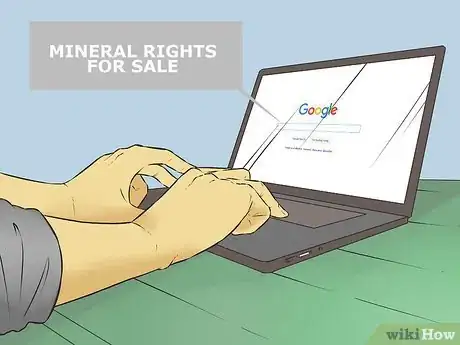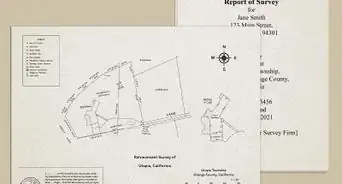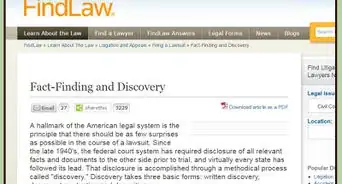This article was co-authored by Michael R. Lewis. Michael R. Lewis is a retired corporate executive, entrepreneur, and investment advisor in Texas. He has over 40 years of experience in business and finance, including as a Vice President for Blue Cross Blue Shield of Texas. He has a BBA in Industrial Management from the University of Texas at Austin.
wikiHow marks an article as reader-approved once it receives enough positive feedback. In this case, 100% of readers who voted found the article helpful, earning it our reader-approved status.
This article has been viewed 80,202 times.
If you're interested in buying mineral rights, the simplest way is to purchase them directly from the mineral owners. It's more common to lease the rights for a specific length of time, but if you want permanent ownership, we can help you navigate the process of finding mineral rights for sale, negotiating the terms, and finalizing the deal.
Steps
Researching Mineral Rights
-
1Find out if the mineral rights are available for purchase. Go to the local county courthouse to research who owns the mineral rights for a particular piece of property. The property's deed might not include information about mineral rights, because states often record mineral rights ownership in a separate Mineral Rights deed book separate from the book recording surface rights.[1]
- Transactions concerning mineral rights are generally a matter of public record, and you should be able to confirm ownership of these rights.
- If you are buying "surface" property in an area known for potential mineral development, you will need to determine if the mineral rights have already been sold. The buyer of a property should hire an attorney who can do this research.[2]
-
2Research which minerals are considered the most lucrative. The top 5 in the world are oil and gas, gold, copper, diamonds, and coal. In the U.S., oil and gas are the most prevalent minerals for mining.[3]
- These ten states contain 80% of the oil and gas reserves in the U.S.: Texas, North Dakota, Alaska, California, New Mexico, Oklahoma, Wyoming (oil only), Colorado (large deposits of coal as well), Utah and Louisiana.
- A mineral that will be in high demand now and the near future is lithium, used in most electronics that require batteries. Three countries have half the world's lithium deposits: Argentina, Bolivia, and Chile.[4]
Advertisement -
3Find mineral rights that are for sale. You should be able to find websites that list mineral rights for sale or for lease throughout the U.S. and Canada. You may, however, need to subscribe to the service if you are a buyer.
- Companies usually contact the property owner to purchase mineral rights after a geologist or other professional has a reason to believe that the desired mineral exist in the area.
-
4Define which "mineral" is in the area where the property is located. Determine if the material is actually a mineral as defined by the state or federal government. Although this may sound like a simple task, the definition may vary from state to state or from one situation to another.[5]
- For example, in 2004 the United States Supreme Court ruled that sand and gravel are not considered minerals.
-
5Learn the specific state laws that govern the sale of mineral rights. Each state abides by certain mining and drilling regulations that affect both surface and mineral property sales. These laws are often similar with slight variations.
- For example, "fracking," the mining of natural gas, is banned in New York state while it is permitted in Pennsylvania. Hydrocarbons such as oil and natural gas are generally included under the term "mineral rights."
- Although laws governing mineral rights are usually uniform among regions, it's possible the laws governing mining and specific oil and gas regulations can vary greatly between states.
Purchasing Mineral Rights
-
1Negotiate the terms of the mineral rights sale. This not only includes the price paid for the rights but also the specific terms of the agreement. These terms can include the specific mineral(s) you want to extract,the legal description of the property, how you'll access the property, what steps you'll take in preventing damage to the property, how you'll fix any damage that occurs, the use of any available fresh water and many other factors.
- In most mineral rights transactions the buyer has the most say in how the mining will be conducted, when it will take place, how and what will be done, if anything, to fix the property afterwards. If the seller wants any control when the mining starts, he must think about what could go wrong and develop a contract that will cover his wishes, and that of future generations.[6]
-
2Draw up the mineral rights agreement. Make sure both you and the owner understand all the terms set forth before both of you sign the agreement to finalize the deal. If you're unfamiliar with negotiating to buy mineral rights, you should consult an attorney who specializes in the sale and transfer of mineral rights.
- Include access to fresh water in the agreement. Oil and gas mining requires a large quantity of fresh water during the mining process. If you can have access to nearby water, it will save you a lot of money.[7] Confirm both access, price, and any limits to use of water.
- The agreement should cover a long time period as you may not want to begin mining right away.
-
3Draw up a mineral rights lease. If you decide to lease the mineral rights, the agreement will have extra terms, such as the length of the lease and amount of the royalty payment for the owner. The royalty payment is typically a combination of cash and royalty; a percentage of the production value or a fixed amount per ton or barrel of produced minerals.
- Do not attempt to write up the mineral rights lease yourself. Contact an attorney experienced in mineral rights leasing. Some states have laws that require mining and drilling companies to pay a minimum royalty percentage to property owners.
Making Money Buying Mineral Rights
-
1Determine the advantages of buying vs. leasing mineral rights. Mineral extraction usually occurs at some time in the future as equipment and employees are often scheduled years in advance. If you do not start mining or drilling operations before the expiration of a lease, then all rights to the property and the minerals reverts back to the owner.
- Oil and gas have the ability to cross property boundaries underground. Some states require drilling companies to specify how oil and gas royalties will be shared among adjacent property owners.[8]
-
2Lease rather than purchase gas and oil rights. There is usually no guarantee that gas or oil will be present, so it would be to your advantage to pay a smaller amount for a lease rather than purchasing outright that will cost more. A lease gives you the right to test the property for minerals.[9]
-
3Purchase the mineral rights as a speculator. Speculators buy the property with the goal to sell the mineral rights to another company who will do the actual production. It is an opportunity to acquire valuable property from individual owners and sell those properties to mining companies for a higher price than what you paid.
-
4Purchase mineral rights as an option. In an option transaction a property owner is offered a small amount of money today for the option of buying the property at a certain price before a specified date in the future. You would then quickly try to find someone who will pay an even higher price, purchase the property from the owner, and then sell the buyer your mineral rights. If you fail to pay the specified price by the expiration date of the option, the property owner keeps the option payment.
-
5Invest in oil and gas royalties. Companies such as Patriot Royalties do all the purchasing of mineral rights and the mining. Investors receive monthly income, and you don't pay taxes on 15% of the production from a well.
- Like other assets, oil and gas royalties can be bought, sold or transferred. The royalty income lasts for as long as the well produces, which may be several decades.
-
6Familiarize yourself with local and state laws. Most mining and drilling activity is regulated by state law. These laws may restrict extraction or require additional expenses, so make sure you are familiar with all regulations relating to extracting the minerals. Also, consider that laws may change or new laws and regulations may be passed which impact your ability to extract minerals.
- Note that if you are merely receiving royalties and are not the majority owner of the mineral rights, you have no say in the production schedule. If the majority owner decides prices are too low, they may cease production at any time, which will stop the flow of royalties.
References
- ↑ http://geology.com/articles/mineral-rights.shtml
- ↑ http://geology.com/articles/mineral-rights.shtml#what
- ↑ http://answersafrica.com/african-minerals.html
- ↑ http://siteselection.com/theEnergyReport/2013/jan/natural-resources.cfm
- ↑ http://www.ogs.ou.edu/oilgasfaq.php#4
- ↑ http://geology.com/articles/mineral-rights.shtml
- ↑ http://www.mineralweb.com/owners-guide/lease-proposals/oil-and-gas-leases-10-common-mistakes-during-mineral-lease-negotiation/
- ↑ http://geology.com/articles/mineral-rights.shtml#what
- ↑ http://geology.com/articles/mineral-rights.shtml#what
About This Article
To buy mineral rights, start by researching which minerals are the most lucrative, what the local laws are about purchasing the rights, and which mineral rights are currently for sale. Next, negotiate the terms of the mineral rights sale, including the price and the specific terms of the agreement, with the seller. If you’re unfamiliar with the negotiating process, it's best to consult an attorney who specializes in the sale and transfer of mineral rights. Then, draw up the mineral rights agreement to finalize the deal! To learn more about leasing instead of buying mineral rights, read on!










































































